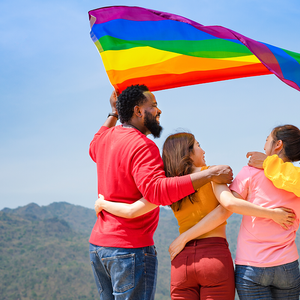CONTACTStaffCAREER OPPORTUNITIESADVERTISE WITH USPRIVACY POLICYPRIVACY PREFERENCESTERMS OF USELEGAL NOTICE
© 2024 Pride Publishing Inc.
All Rights reserved
All Rights reserved
By continuing to use our site, you agree to our Private Policy and Terms of Use.
"
>
"
data-page-title="
As the United States launches into the second Gulf War, one of its most nettlesome military personnel policies is under escalating criticism at home. Ten years after President Clinton proposed it, the "don't ask, don't tell" policy remains in place--an awkward compromise that allows gay men and lesbians to serve in uniform as long as they keep quiet about their sexual orientation. Some people yearn to reinstate the previous policy, which made clear that gay people were not welcome in the ranks. From the opposite flank, there is greater pressure than ever to allow gays to serve openly; gay rights groups argue that the military's war-readiness is undercut by a policy that alienates gay soldiers or forces them from the ranks. The Bush administration and the Pentagon say there are no imminent plans to abandon "don't ask, don't tell." "As Winston Churchill said of democracy, it's the worst system possible, except for any other," said Charles Moskos, a Northwestern University sociologist who helped devise the policy. "The military says it's working OK; it's the best option available. I think it's here indefinitely." Recent initiatives against the "don't ask, don't tell" policy include those from: 1) Human Rights Watch, the largest U.S.-based human rights organization, which issued a report denouncing "don't ask, don't tell," urging President Bush to repudiate it and assailing the military as "a bastion of officially sanctioned discrimination against homosexuals." 2) Servicemembers Legal Defense Network, a legal assistance group for gays in the military, which launched a "Freedom to Serve" campaign aimed at overturning the policy. The network also reports an upsurge of requests for advice and support from gay service members deployed in the Middle East. 3) The Human Rights Campaign, a leading gay rights group, which compiled first-person accounts from dozens of gay and lesbian veterans describing the challenges of serving dutifully in an unwelcoming environment. "I loved the Navy--it was good to me--but I was very bitter my last few years," said one of those veterans, Nick Marulli, who served from 1977 to 1997. "It was difficult having to live in two worlds." To guard against a discharge that would jeopardize his pension, Marulli avoided telling even close friends in the service that he is gay. He is convinced that gays could serve openly without problems if political and military leaders backed the change. "The military is about discipline, it's about the example set by leaders," said Marulli, 44, now a computer instructor in Crofton, Md. "If the command says, 'This is our policy; you're going to live by it and respect it,' people would jump in line and say, 'Yes, sir."' The Pentagon considers the policy a mandate from Congress and says its duty is to implement it. "There are no plans to change or modify the policy at this time," the Defense Department said in a statement. "The department continues to work tirelessly to administer that law in a manner that is both fair and consistent...treating all service members with dignity and respect." Secretary of State Colin Powell, former chairman of the Joint Chiefs of Staff, defended the policy in a recent interview with teenage reporters for the magazine Teen Ink. Though most forms of discrimination against gays are wrong, Powell said, "I think it's a different matter with respect to the military because you're essentially told who you're going to live with, who you're going to sleep next to."
"Don't ask, don't tell" at war
" >Want more breaking equality news & trending entertainment stories?
Check out our NEW 24/7 streaming service: the Advocate Channel!
Download the Advocate Channel App for your mobile phone and your favorite streaming device!
From our Sponsors
Most Popular
Here Are Our 2024 Election Predictions. Will They Come True?
November 07 2023 1:46 PM
Meet all 37 of the queer women in this season's WNBA
April 17 2024 11:24 AM
17 Celebs Who Are Out & Proud of Their Trans & Nonbinary Kids
November 30 2023 10:41 AM
Here Are the 15 Most LGBTQ-Friendly Cities in the U.S.
November 01 2023 5:09 PM
Which State Is the Queerest? These Are the States With the Most LGBTQ+ People
December 11 2023 10:00 AM
These 27 Senate Hearing Room Gay Sex Jokes Are Truly Exquisite
December 17 2023 3:33 PM
10 Cheeky and Homoerotic Photos From Bob Mizer's Nude Films
November 18 2023 10:05 PM
42 Flaming Hot Photos From 2024's Australian Firefighters Calendar
November 10 2023 6:08 PM
These Are the 5 States With the Smallest Percentage of LGBTQ+ People
December 13 2023 9:15 AM
Here are the 15 gayest travel destinations in the world: report
March 26 2024 9:23 AM
Watch Now: Advocate Channel
Trending Stories & News
For more news and videos on advocatechannel.com, click here.
Trending Stories & News
For more news and videos on advocatechannel.com, click here.
Latest Stories
John Fetterman challenges Pa. school board’s cancellation of talk by gay actor
April 19 2024 2:39 PM
New study finds inadequate response to mpox outbreak
April 19 2024 2:06 PM
Fighting back against MAGA’s attacks on equality
April 19 2024 1:00 PM
Just one Christian Nationalist group is behind Idaho's bans on trans care and abortion
April 19 2024 11:57 AM
Linda Perry opens up in new documentary, premiering in June at Tribeca Festival
April 19 2024 11:43 AM
Trans woman loses lower legs in NYC subway attack. Now, friends rally to help her
April 19 2024 10:06 AM
Black trans woman África Parrilla García shot to death in Puerto Rico
April 18 2024 4:55 PM
Marjorie Taylor Greene has sunk so low even Fox News can't stand her anymore
April 18 2024 4:04 PM
Single lesbians are avoided by straight women, but not straight men. Here's why.
April 18 2024 3:18 PM
The LGBTQ+ movie fan's guide to the 2024 TCM Classic Film Festival
April 18 2024 2:44 PM
The federal government failed on mpox. Ritchie Torres's new bill addresses that (exclusive)
April 18 2024 1:21 PM
True
In the face of tweets and turmoil, why I left the South as a medical student
April 18 2024 7:30 AM
















































































